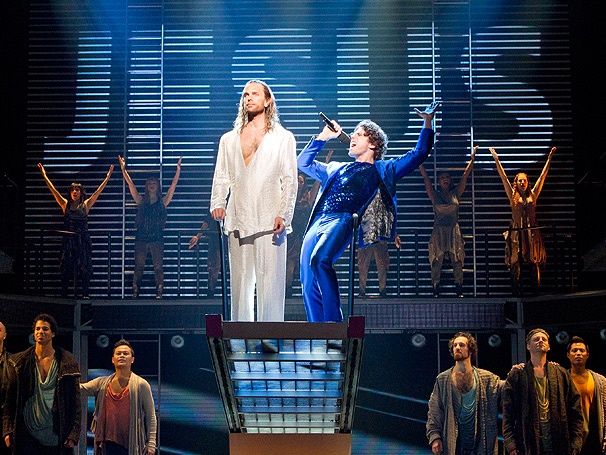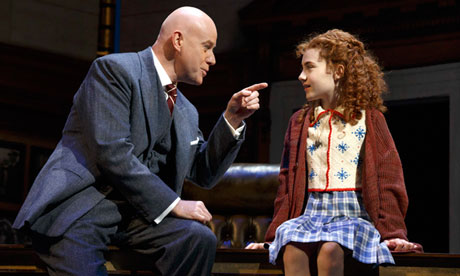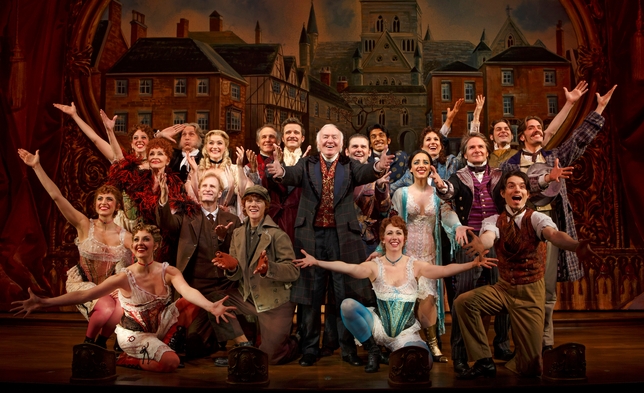Movie Review: Les
Miserables
 |
| Anne Hathaway and Hugh Jackman, the most impressive of the highly accomplished stars of Les Miserables. |
Musical theatre fans everywhere can breathe a sigh of
relief. The long awaited big screen
adaptation of Les Miserables is not
just a good movie musical but a great one, working as both a successful
adaptation and a strong film in its own right.
Tom Hopper’s lovingly crafted epic may have a few faults, but they are
mere nitpicks in a film that does so much right with what could have gone so
very wrong.
The plot of Les
Miserables, the musical adaptation of Victor Hugo’s sprawling novel, tells
the story of convicted thief Jean Valjean and his lifelong struggle towards
redemption in 19th century France.
After breaking his parole, Valjean goes into hiding and eventually meets
disgraced factory worker Fantine before becoming the guardian of her daughter
Cosette. The pair moves to Paris, where
Cosette falls in love with student revolutionary Marius right before he spearheads
a violent uprising against the Parisian elite.
All the while, Valjean is relentlessly pursued by the rigid Inspector
Javert, the one man who knows Valjean’s past and could see him locked away
forever.
For those who wondered how Hopper and screenwriter William
Nicholson would condense the three-hour pop opera into a typical movie runtime,
the short answer is they didn’t.
Although a couple of verses and some incidental music have been trimmed,
every musical number from the stage version is represented (even
“Turning”). The order has been tweaked, but
as in West Side Story these changes
feel organic and are often for the best.
Hopper and Nicholson have even found room for a new song, “Suddenly,”
which illustrates the instant connection and responsibility Valjean feels for
young Cosette. It may not be equal to
the greatest pieces of Claude-Michel Schonberg and Alain Boublil’s score, but it
works as a nice character moment and a welcome change of pace from all the
bombastic power ballads.
The transfer from stage to screen does reveal some flaws in Les Miserables’ construction, as
elements that go unquestioned in the theatre feel underwritten on the big screen. The reasons behind the student uprising that
forms the crux of the second half are never satisfactory explained (something
about “the people”), and the love triangle between Cosette, Marius, and street
urchin Eponine is underexplored. But
while some details could stand fleshing out, the emotional truth of the story
remains intact and powerful, and those prone to tears should definitely bring
some tissues.
The star-studded cast is uniformly excellent, even those
with zero musical or theatrical experience.
Hugh Jackman anchors the movie with his innate charisma and a fine flair
for the dramatic, with his expressive face conveying the depth of Valjean’s internal
conflict. His voice does sound a wee bit strained on the high notes, but
I can’t think of another movie star better qualified to tackle such a mammoth role. And if we’re going to get really nitpicky,
they probably could have aged Jackman more for the movie’s final act, although
the actor’s expressive eyes go a long way towards conveying Valjean’s growing weariness.
The true revelation among the cast is Anne Hathaway’s
devastating turn as Fantine, the factory girl who resorts to prostitution in
order to support herself and her child.
Hathaway pulls out all the stops for her bravura performance, committing
to the role physically and emotionally in a way few actresses could
manage. In a film full of big songs her
“I Dreamed a Dream” is the
showstopper, a gut-wrenching depiction of a woman with nothing more to
lose. Hathaway is a guaranteed Oscar
nominee, and it’s unfortunate the constraints of the story keep her from being
in more of the movie. Whenever she does
appear, it is pure movie magic.
Russell Crowe does an excellent job as the relentless
Inspector Javert, although the role’s restrained nature keeps him from cutting
loose the way his costars can. Crowe possesses
an unexpectedly strong singing voice, and while his strict adherence to the
written rhythms is initially jarring in comparison to everyone else’s free-form
recitative, it ultimately works as a character choice which further illustrates
his unbending nature. Amanda Seyfried
has surprisingly little to do as Cosette (while none of her material has been
cut, the role feels much more substantial in the stage version), and while a fine
actress her lightning-quick vibrato is the one vocal quirk this reviewer can’t
quite overlook. Seyfried does have
excellent chemistry with Eddie Redmayne’s Marius, and the young actor’s ease in
the role goes a long way towards making the second half of the film work.
Samantha Banks’ Eponine is gloriously sung and looks
properly pensive, although her underwritten character arc doesn’t leave as much
of an impression as it could have. Sacha
Baron Cohen and Helena Bonham Carter are perfectly cast as the wily Thenardier
and his wife, and their scene stealing antics provide some much-needed levity
amid all the angst and suffering. Of all
the major characters, the Thenardiers have the least bearing on the central
plot, but Cohen and Carter are so hysterical that their every appearance is
appreciated.
The movie’s production design is exemplary, with the dingy costumes,
makeup, and set design giving the musical a grounded quality it never had
onstage. The sweeping vistas on display
are quite breathtaking, but unfortunately Hopper’s direction is much more enamored
with various awkward close-ups. It’s
difficult to tell if the problem stems from the precise angle of the camera or from
the actors’ visible discomfort directly addressing it, but these shots pull your
attention out of the movie and make many of the solos appear visually
flat. The few that do switch up the
shooting style, such as “Stars” and “Master of the House,” are notably stronger
for it.
Overall, Les
Miserables is a stunning achievement that should delight fans of the stage
version and nonbelievers alike. Top-tier
production values and truly compelling performances help disguise the source
material’s occasional shortcomings, and the movie manages the difficult task of
remaining faithful to the stage version while simultaneously succeeding on its
own merits. Any theatre aficionado owes
it to themselves to see this movie, and rediscover the joys of one of the
seminal musicals of the past thirty years.






